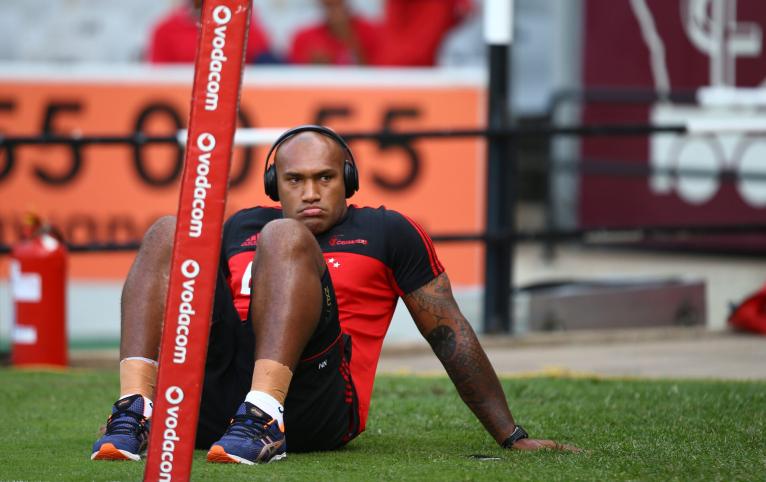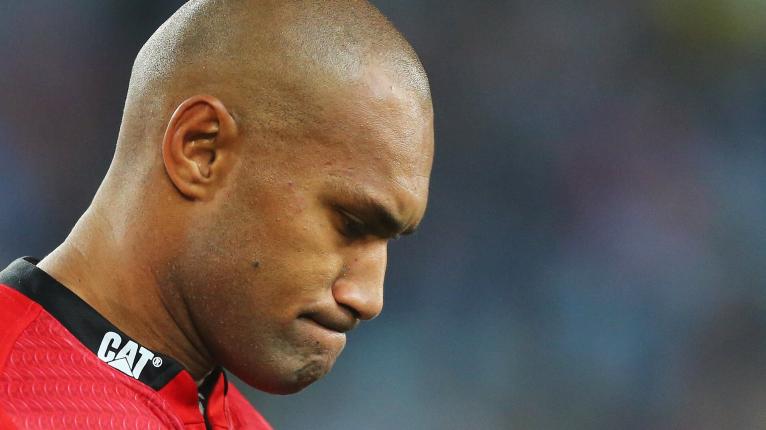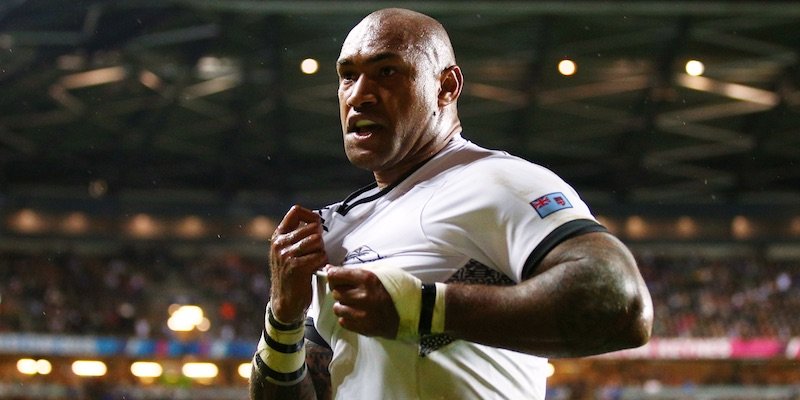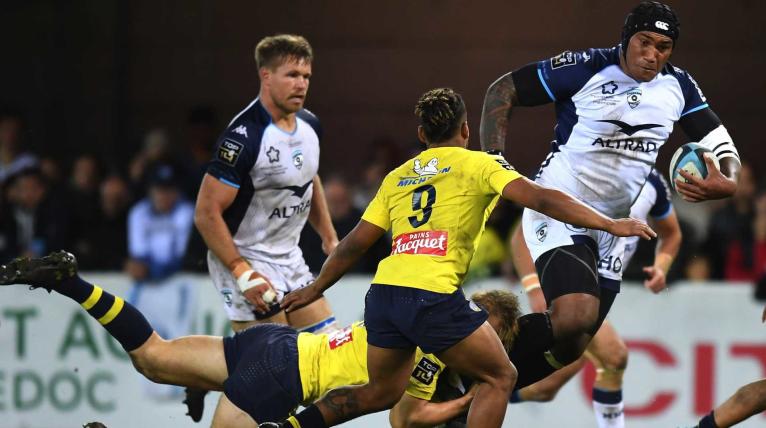'Unfit chubby n*****' - Nadolo on racism in rugby, traditional healers and why he quit Fiji

The immense toll of professional rugby catches up with everyone sooner or later, even those as mighty as Nemani Nadolo.
At only 31, the Fijian totem and Montpellier galactico has retired from the international game, his hulking form beginning to fray under the relentless strain of performing for club and country.
Nadolo is a brilliant footballer with plenty miles left on the clock but he is not a robot. The Top 14 is long and punishing and he has come to feel like hamster on a wheel that never stops spinning.
The winger’s toil, of course, is handsomely rewarded by Mohed Altrad. His lifestyle in the south of France is barely the picture of hardship either, but eventually, his body has started to crack and his mind grown weary.
Nadolo’s season has been dogged by a persistent knee injury and it speaks volumes about how brutal rugby can be that even the lure of the World Cup and the joy of playing for his islands and his people on the grandest stage of all was not sufficient to delay retirement.
“I could’ve waited ‘til after the World Cup but it just felt right to do it now. It felt like a big burden off me. Probably the last 10-11 months I’ve been thinking about it,” he says.
Continue reading below…
“The amount of rugby I’ve played in the last four years has taken its toll on my body. I went from Super Rugby [with the Crusaders in 2016] straight to French rugby and not really having a rest, then from that into internationals. In two seasons, I’ve played 50-odd club games alone. Along the way, I picked up a lot of niggles and injuries. This season, everything probably caught up with me.
“The Top 14 is a slog; you’re playing 28 games, then Champions Cup. If you’re a foreign player, you’re going to get played a lot.
“You’ve got to find your way to keep getting yourself back up and doing the same thing. It’s a very physical game here, but it’s also one of the toughest comps I’ve played in mentally.

“As players, we know what we sign ourselves up for, but it’s not until you get here that you experience it. I’m used to it now, there are ways you can get yourself up and learn to chill out, but it’s a different world over here.”
Nadolo knows he is lucky to be where he is, wealthy and revered. He signed a new contract in September but virulently refutes any notion Montpellier pressured or incentivised him to give up playing for Fiji.
“Giving the international scene a knock on the head was going to allow me to not only start thinking about stuff like that, but just enjoy my rugby.
“Don’t get me wrong, I’ve enjoyed every minute playing for Fiji and it’s always been an honour, but I think doing this will add a few more years to my career. It’s one of those decisions where you sometimes find you have to be selfish about it, as bad as that sounds. At the end of the day, it’s you that’s going to be going through all of it.

“People talk about, maybe he got a little paycheque, a little bonus here and there to retire, but I can honestly say that’s not true. I would never, ever stop playing for my country for money. It’s never been about the money.”
Seeking a lasting cure for his troublesome knee, Nadolo returned to his roots. He spent four days on the archipelago last week to harness the restorative powers of a traditional Fijian healer.
Waisake Naholo, the All Blacks wing born in the same province as Nadolo, famously made a Lazarus-like recovery from a broken leg after visiting a healer before the 2015 World Cup. England centre Manu Tuilagi said a “witch-doctor” in Samoa helped him banish the malevolent spirits that inflicted a barrage of injuries upon him.
“I hate saying it’s the witch-doctor – we definitely don’t call it that – but it’s someone with special healing powers. Funnily enough, I went there, got my knee done, and it’s heaps better. I’ve started running already,” Nadolo says.
“They oil and rub your knee. They massaged and prayed over it for a whole day. Then they put thirty slits in my leg, put a cup over it, all this blood comes out. It was a three-day procedure.
“We grew up on this. Whenever something happened to us, there was a certain thing you’d drink or a certain thing they’d do to your body. I didn’t really tell the club, I just went, came back and told them – nothing was going to stop me whether they said yes or no, because I know this has worked.

“It’s something we’ve grown up on, a cultural point of view, and the club respect it.”
Respect is held dear in rugby, a sport that can be quick to seize the moral high ground and preach its values. Generally, those tenets hold firm. But stories emerge that abhor us all.
In 2014, while playing for the Crusaders, Nadolo says he was called an “unfit chubby n*****” in a Christchurch bar. While out with his family in France last year, a drunken fan allegedly described his match-winning performance against Clermont as “not bad for a monkey”. More recently, former Springbok wing Ashwin Willemse walked out of the SuperSport studio while live on air after comments from co-analysts Nick Mallett and Naas Botha he felt were “rooted in racism”, and Ulster handed a lifetime ban to a supporter who racially abused Racing 92’s Simon Zebo in a Champions Cup match.
Nadolo says racism and discrimination has “always been there” in rugby but is “starting to get unearthed” with the growth of social media.
“There have always been idiots talking. Usually they’re far away from you on the field. What I find really amusing is they don’t own up to it [afterwards] – it’s just gutless people.
“We’re not only dealing with racism now, we’re dealing with homophobia. We need to come out with a commercial – and I’ve yet to see one –around racism and equality, making rugby a safe place.
“There’s always more we can do, always. Why can’t we all do it, get together, get some of the leading rugby players, black, white, gay, lesbian, whatever, and do something about it. Let people know that rugby is for everyone – we talk a lot about it but not much is done.”
In an illuminating column posted in 2015 (link for embedding: ), the New Zealand Herald addressed the issue of overt “racial stereotyping”. It cited an article by Auburn University professor John Carvalho, which “outlined four separate American studies that looked at the language of professional sports reporting. In short, the findings were all similar: white players have the intelligence, black players have the physical attributes.”

In the build-up to Fiji’s 2015 World Cup opener against England, Nadolo was asked to pose for a photograph cradling the journalist who had just interviewed him. The story was flattering and the image may seem a harmless and striking method of depicting the winger’s size. It is hard, though, to imagine George North, Brodie Retallick, or Richie Gray being asked to perform a similarly gratuitous display of strength.
“Every time I see that photo, I’m like, ‘what an idiot’. I kept saying I didn’t want to do it. That incident did really annoy me,” Nadolo recalls.
“It’s always about being big or too big. As long as it’s not offensive, I’m cool with it. The moment you start talking smack or being smart about it, I’m going to call you out.”
Nadolo has never shirked “calling out” injustice.
The plight of young, duped and destitute Pacific Islanders, adrift and lonely beneath the poverty line in the French lower leagues is well-documented, and sometimes bears tragic consequences. In November 2016, Fijian prop Isireli Temo committed suicide in France. He was playing for third-tier side Tarbes.
Nadolo dedicates what time he can to supporting and giving a “voice” to his countrymen in need, as one of six representatives of the tremendous Pacific Rugby Players Welfare group based in France.
“A lot of clubs in France don’t obey the rules or don’t pay their players. That’s where we come in and we work with Provale [the French players union] and the Rugby Players Association in England. We represent our country and our people here,” Nadolo says.
“They’re shy, they’re young, they don’t know what to do. They come over here on a hope and a prayer. A lot of the time in France, the clubs tell you one thing and do the other – that’s where the Fijian boys go wrong. They’re promised they’ll be looked after and they get over here and they’re scrambling to find a place or a pair of boots.
“Just the other day, I had a kid who plays for a Federale 2 [fourth-tier] club down here who needed some boots. It was as simple as going down the local rugby store and getting a pair of boots and putting them in the mail.
“As Fijians, we’re a culture that we help each other out, and if needs be, we reach into our pockets. We’re all they have here.”











































